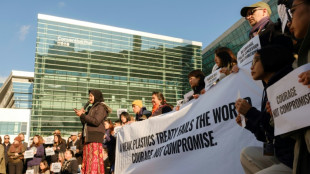
-
 Shiffrin leads Killington giant slalom in pursuit of 100th victory
Shiffrin leads Killington giant slalom in pursuit of 100th victory
-
Kosovo arrests blast suspects, Serbia denies involvement

-
 Las Palmas stun Liga leaders Barca on 125th anniversary
Las Palmas stun Liga leaders Barca on 125th anniversary
-
Piastri wins Qatar Grand Prix sprint as McLaren widen gap on Ferrari

-
 Syria war monitor says rebels control most of Aleppo
Syria war monitor says rebels control most of Aleppo
-
Trudeau meets Trump in Florida as tariff threats loom

-
 Scholz, rival trade blows as German election campaign kicks off
Scholz, rival trade blows as German election campaign kicks off
-
Kosovo races to contain blast impact, Serbia denies involvement

-
 Taiwan's Lai flies to US to start tour of Pacific, angering China
Taiwan's Lai flies to US to start tour of Pacific, angering China
-
South Africa thrash Sri Lanka to fuel World Test Championship bid

-
 Mbappe's problem is Real Madrid's problem, says Ancelotti
Mbappe's problem is Real Madrid's problem, says Ancelotti
-
What do we know about Syrian rebels' major offensive on Aleppo?

-
 South Africa beat Sri Lanka by 233 runs in first Test
South Africa beat Sri Lanka by 233 runs in first Test
-
Incumbent centre-right in 'driving seat' in Irish vote

-
 Georgia arrests 107 more people as pro-EU protests continue
Georgia arrests 107 more people as pro-EU protests continue
-
Taiwan's Lai departs for US stopover during Pacific trip

-
 Kosovo raises security after blast, Serbia denies involvement
Kosovo raises security after blast, Serbia denies involvement
-
More than 122,000 people evacuated in Malaysia due to floods

-
 Vietnam to build $67 bn high-speed railway
Vietnam to build $67 bn high-speed railway
-
Nations warn of deadlock at landmark plastic pollution talks

-
 Taiwan's Lai departs on Pacific island tour
Taiwan's Lai departs on Pacific island tour
-
Syria war monitor says rebels control 'most of' Aleppo city

-
 Greenpeace activists board tanker in plastic protest
Greenpeace activists board tanker in plastic protest
-
Floods displace 122,000 people in Malaysia

-
 Taiwan's Lai set to depart on Pacific island tour
Taiwan's Lai set to depart on Pacific island tour
-
American Johnston reels in Herbert at Australian Open

-
 Hawks top Cavs again to advance in NBA Cup, Boston beat Bulls
Hawks top Cavs again to advance in NBA Cup, Boston beat Bulls
-
South Korea star Jung Woo-sung apologises after baby scandal

-
 Romania's economic troubles fuel far-right rise
Romania's economic troubles fuel far-right rise
-
England on verge of wrapping up first New Zealand Test

-
 Icelanders head to the polls after government collapse
Icelanders head to the polls after government collapse
-
England strike twice to have New Zealand in trouble in first Test

-
 Researchers analyse DNA from dung to save Laos elephants
Researchers analyse DNA from dung to save Laos elephants
-
North Korea's Kim, Russian minister agree to boost military ties

-
 Brook's 171 gives England commanding 151-run lead over New Zealand
Brook's 171 gives England commanding 151-run lead over New Zealand
-
Kamala's coda: What's next for defeated US VP Harris?

-
 Chiefs hold off Raiders to clinch NFL playoff berth
Chiefs hold off Raiders to clinch NFL playoff berth
-
Australia's Hazlewood out of 2nd India Test

-
 Trudeau in Florida to meet Trump as tariff threats loom
Trudeau in Florida to meet Trump as tariff threats loom
-
Jihadists, allies breach Syria's second city in lightning assault

-
 Trudeau in Florida to meet Trump as tariff threats loom: media
Trudeau in Florida to meet Trump as tariff threats loom: media
-
Hunter shines as Hawks top Cavs again

-
 Southampton denied shock Brighton win by dubious VAR call
Southampton denied shock Brighton win by dubious VAR call
-
Alarm over high rate of HIV infections among young women, girls

-
 Swiss unveil Euro 2025 mascot Maddli
Swiss unveil Euro 2025 mascot Maddli
-
Bears fire coach Eberflus after latest agonizing NFL defeat

-
 Rallies mark one month since Spain's catastrophic floods
Rallies mark one month since Spain's catastrophic floods
-
Arnault family's Paris FC takeover completed

-
 Georgian police stage new crackdown on pro-EU protestors
Georgian police stage new crackdown on pro-EU protestors
-
'We're messing up:' Uruguay icon Mujica on strongman rule in Latin America


Iraq landslide disaster throws spotlight on informal shrines
When a landslide buried part of an Islamic shrine in Iraq this summer, killing eight pilgrims, sorrow quickly turned to anger because the site was run without oversight from state or religious authorities.
The deadly disaster struck in August near Karbala when tonnes of soggy earth and rock collapsed onto the Shiite shrine Qattarat al-Imam Ali, dedicated to the imam's journey on his way to battle in AD 657.
By the time the search-and-rescue effort was over, three trapped children had been brought out alive -- but the bodies of two men, five women and one child had also been pulled from the rubble.
The shared grief quickly gave way to public fury when Iraqi government and religious officials said they were not responsible for the site, or for policing its building and safety standards.
The shrine was one of hundreds that are being run privately and are therefore unregulated -- many of which, some critics charge, operate with profit rather than piety as the main motive.
Karbala resident Maitham Abbas lashed out at what he called a "fake shrine", dismissing it as a money-making scheme.
Since the tragedy, politicians, clerics and religious officials have acknowledged the need to better enforce building standards in a war-scarred country generally plagued by crumbling infrastructure.
Iraq's Waqf, the body in charge of managing Shiite mosques, tombs and other places of worship, reports that only 135 out of Iraq's 664 known sanctuaries are formally registered.
The others are beyond Waqf's remit and derive their legitimacy from the faith invested in them by flocks of visiting pilgrims, many of whom give what they can in donations.
There are "around 100 shrines dedicated to the daughters of Imam Hassan", who passed only briefly through Iraq, said Hashem al-Awadi, deputy head of the government department responsible for Shiite shrines.
"Where does all this offspring come from?" he asked incredulously.
- Informal pilgrimage sites -
Most Iraqis follow Shiism, a strand of Islam that was long suppressed under dictator Saddam Hussein, a Sunni Muslim, before his secular Ba'athist regime was toppled by the US-led invasion of 2003.
Under Saddam, "an informal approach was cultivated by the people, indeed by the Shiite institutions, to avoid being attached to the state", said Sabrina Mervin, a historian specialising in Shiism.
The post-Saddam years were marred by sectarian violence but also saw a Shiite revival as millions of faithful once more flocked to their holy sites, especially the Shiite shrine cities of Najaf and Karbala.
Hundreds of smaller shrines opened up -- many outside the purview of the religious authorities, which are often reluctant to proactively check building standards for fear of offending believers.
The Shiite revival was driven not by institutions but by "pilgrim practices which evolve from the grassroots, from the religiosity of the faithful", said Mervin, of the French National Centre for Scientific Research.
"If there are pilgrims... there is necessarily a foundation story that makes a place a holy place," she said.
"The religious authorities have no arguments to prevent pilgrims from showing their attachment and devotion to major Shiite figures, even in places that are unrecognised."
- Registration can be tricky -
Most such sites are dedicated to relatives or descendants of Imam Ali, the son-in-law of the Prophet Mohammed and the founder of the Shiite strand of Islam.
One is located on the side of a motorway south of Baghdad, dating back to the 1980s and not registered by the Waqf, where faithful offer chocolate snacks and small cash donations.
Pilgrim Kamel Rahim, 78, was praying to be healed from sickness at the graves of three distant descendants of Imam Ali -- Sayyed Ahmed, Sayyed Ali and their father Al-Mozher.
Rahim explained that local residents had "discovered stones on which their names were inscribed. They dug and found two graves."
Awadi, the state official, said more shrines should seek official recognition, which offers them "legal weight and stature" as well as state development funding, and grants their guardians the status of civil servants.
But the process of authenticating and approving a shrine is protracted, he said, as it involves an assessment of its founding story and "a lineage investigation" of the deceased who is revered there.
This, he explained, can be a sensitive subject, especially if the request is denied.
"If you report a fake shrine," he said, "how many people do you think will believe you, and how many will accuse you of straying from the path of religion?"
K.Thomson--BTB

